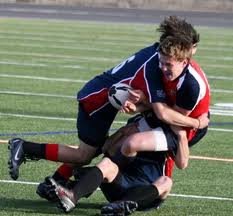
An invited symposium on sports concussion was chaired by Professor Ann Edwards at the 30th International Congress of Psychology held in Cape Town in July 2012. Results were presented from three doctoral and three masters theses conducted on South African players of Rugby Union under her supervision at Rhodes University over the past eight years. Doctoral students included Dr Vicky Alexander, Dr Sue Clark and Ms Diana Zoccola; Masters students were Mr Mark Horsman, Mr Ian Smith and Ms Thandi Salmon-Godlo. With the exception of Mark Horsman and Ian Smith, all were in attendance at the conference to present their own work. Dr Clifford van Ommen (currently Psychology Clinic Director at Massey University in Auckland New Zealand) was also present as the co-supervisor on Ms Salmon-Godlo’s thesis while he was still at Rhodes University. The statistical analyses were conducted on all studies by Professor Sarah Radloff, of the Department of Statistics at Rhodes University. While not in attendance at the symposium she was a co-author on all the presentations in acknowledgement of her invaluable contribution to this entire research series.
A number of these studies investigated the effects of participation in rugby at high school, university, club and professional level rugby. In comparison with age, education and IQ equivalent non contact sports athletes (e.g. swimmers, hockey players, cricketers), across all studies rugby players were consistently found to have lowered memory function, slower reaction times and less efficiency to conduct intellectual and hand motor tasks at speed. The deleterious effect for rugby players is attributed to repeated exposure to head and body impacts in many years of rugby participation mainly incurred from tackling and scrumming resulting in cumulative concussive brain injury.
One doctoral study used special video equipment to monitor the number of tackles taking place in matches over a single season of club rugby. It was found that on average a player was involved in around 100 tackles per season (50% received and 50% taken), a figure that can be at least doubled taking practice games into account, and in turn can be multiplied by the number of years playing rugby, each time potentially jarring the head and causing the brain to shoot backwards and forwards colliding with bony sharp edges within the skull. Given that high school boys by Grade 12 may have been playing rugby for 8 to 10 years , and older club and professional level players for 20+ years, it was pointed out by the researcher how these tackling multiplicative sums add up to many thousands of cumulative brain insults incurred by a single rugby playing individual over these years.
On the basis of a combined analysis of high school and university rugby players it was demonstrated that at the end of a rugby season these athletes failed to demonstrate a learning effect on a processing speed task (the ImPACT visual motor speed composite) whereas this benefit was clearly in evidence for controls. The outcome of this research raises the concern that a significant proportion of high school and university level rugby playing scholars will not be performing optimally in their speed-dependent end of year exams.
Taken overall, the results of these studies cause a sense of disquiet, if not alarm about the advisability of participation in a contact sport such as rugby. However, the symposium also covered aspects of management of the concussive injury that are currently in place nationally at both the professional and school levels, with a view to making the sport safer from a brain injury point of view. It was pointed out that by monitoring rugby players with annual baseline neurocognitive evaluation on an instrument such as the ImPACT test, and careful follow up testing after a concussion, it is possible to identify players who are showing cognitive fall off and in this way provide a measure of protection into the sport by keeping them out of play until fully recovered from a concussion. Also, via this process it is possible to identify when a player should advisedly give up participation in a contact sport. The parameters of the ImPACT test that was developed and is in wide usage in the US were reviewed. South African specific normative data based on two masters theses were presented for South African English and Xhosa speaking high school boys, as well as for an Afrikaans version of the test.
Dr Mark Lovell, developer of the ImPACT test and former Director of the University of Pittsburgh Sports Concussion Center, joined the panel discussion at the end of the symposium during which a lively set of questions was directed at the presenters. Dr Lovell is a consultant on the management of concussive brain injury for many US sports organizations including the National Football League, the National Hockey League, US military and US Olympics.
